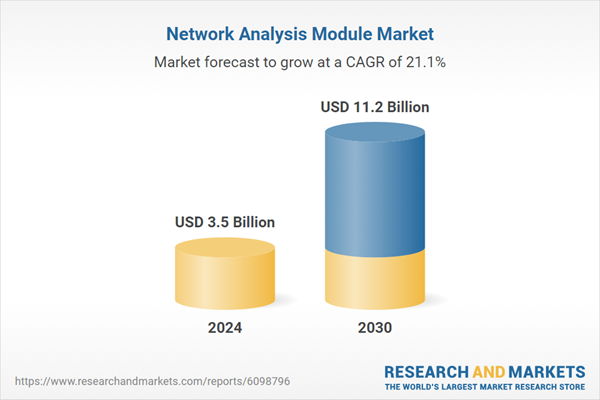Global Network Analysis Module Market - Key Trends & Drivers Summarized
Why Are Network Analysis Modules Becoming Foundational to Modern Network Infrastructure Monitoring?
Network analysis modules (NAMs) are increasingly integral to the infrastructure of enterprises, telecom networks, and cloud service providers, given their ability to provide granular visibility into data flows, application performance, and network behavior in real-time. These modules capture, process, and analyze traffic data from various segments of the network to enable fault detection, bandwidth optimization, latency analysis, and compliance auditing. As hybrid and software-defined networking environments proliferate, the complexity of maintaining operational efficiency and security grows - necessitating continuous, automated network diagnostics.Traditional reactive network troubleshooting methods are no longer sufficient in ecosystems characterized by virtualization, dynamic routing, and multi-cloud deployments. NAMs offer centralized intelligence and diagnostic capabilities, often integrated into routers, switches, or as standalone appliances, that ensure performance monitoring is seamless, scalable, and proactive. These tools provide deep packet inspection (DPI), flow analytics, protocol decoding, and real-time alerting - making them invaluable to network administrators managing high-availability environments or mission-critical services.
How Are Next-Gen Technologies Enhancing the Capabilities of Network Analysis Modules?
NAMs are evolving rapidly with the integration of machine learning, AI-driven anomaly detection, and cloud-native architectures. Advanced modules now support AI-based traffic baselining to identify deviations indicative of congestion, misconfigurations, or malicious activity. These tools can auto-correlate events across layers, perform root cause analysis, and visualize network behavior through intuitive dashboards - reducing mean time to resolution (MTTR) and improving operational agility. Additionally, many NAMs now support programmable APIs, enabling integration with orchestration frameworks and ITSM platforms.Edge computing, 5G, and IoT ecosystems are driving demand for distributed network analysis, where NAMs provide edge-level visibility while feeding telemetry data into centralized analytics engines. Support for encrypted traffic analysis, adaptive sampling, and application-aware monitoring ensures performance is measured even when traditional packet inspection is limited. Modular software-defined components are replacing legacy hardware-bound tools, allowing for flexible deployment in on-premises, cloud, or hybrid environments. These advancements position NAMs as enablers of performance observability, network optimization, and SLA compliance across modern IT ecosystems.
Which Industry Sectors and Enterprise Use Cases Are Fueling NAM Adoption Globally?
NAMs are widely deployed across telecommunications, cloud service providers, financial institutions, government agencies, and healthcare networks - industries where latency, uptime, and regulatory compliance are non-negotiable. Telecom operators use NAMs to analyze core, aggregation, and access layers to manage VoIP quality, optimize transport paths, and monitor subscriber experience. Enterprises rely on NAMs for data center performance monitoring, WAN optimization, application delivery assurance, and ensuring Quality of Service (QoS) for critical business applications.In financial services, NAMs support ultra-low-latency trading networks by detecting microsecond-level jitter or congestion. In healthcare, they ensure the secure and uninterrupted flow of patient data across EMRs and telehealth platforms. Government agencies utilize NAMs for policy enforcement, data exfiltration prevention, and operational monitoring across distributed networks. As digital transformation accelerates across sectors, the need to correlate user experience, application behavior, and network performance in a unified analytics layer is driving widespread adoption of NAMs.
What Is Fueling Long-Term Growth and Innovation in the Network Analysis Module Market?
The growth in the network analysis module market is driven by the increasing digital complexity of enterprise environments, the convergence of performance and security monitoring, and the demand for real-time, actionable insights into network operations. Rising investments in SD-WAN, hybrid cloud, and network function virtualization (NFV) are necessitating deeper, more flexible analytics at every layer of the network stack. As networks transition from hardware-centric to software-defined, NAMs are evolving into microservices-based, containerized platforms that can scale elastically and adapt to changing topologies.Innovation is being fueled by partnerships between network infrastructure vendors and analytics providers, who are co-developing embedded NAM functionalities within routers, switches, and firewalls. OpenTelemetry adoption and standardized telemetry streaming are improving interoperability and ecosystem integration. Future NAMs will incorporate digital twin models, self-healing logic, and closed-loop automation - enabling predictive maintenance and autonomous networking. As performance visibility becomes mission-critical for business continuity and security posture, NAMs will remain essential tools for intelligent, adaptive, and resilient network management.
Report Scope
The report analyzes the Network Analysis Module market, presented in terms of market value (US$). The analysis covers the key segments and geographic regions outlined below:- Segments: Component (Hardware, Software); Deployment (On-Premise, Cloud); End-User (IT & Telecom, BFSI, Healthcare, Manufacturing, Energy & Utilities, Other End-Users).
- Geographic Regions/Countries: World; United States; Canada; Japan; China; Europe (France; Germany; Italy; United Kingdom; Spain; Russia; and Rest of Europe); Asia-Pacific (Australia; India; South Korea; and Rest of Asia-Pacific); Latin America (Argentina; Brazil; Mexico; and Rest of Latin America); Middle East (Iran; Israel; Saudi Arabia; United Arab Emirates; and Rest of Middle East); and Africa.
Key Insights:
- Market Growth: Understand the significant growth trajectory of the Hardware Component segment, which is expected to reach US$8 Billion by 2030 with a CAGR of a 23.4%. The Software Component segment is also set to grow at 16.5% CAGR over the analysis period.
- Regional Analysis: Gain insights into the U.S. market, valued at $961.4 Million in 2024, and China, forecasted to grow at an impressive 28.7% CAGR to reach $2.7 Billion by 2030. Discover growth trends in other key regions, including Japan, Canada, Germany, and the Asia-Pacific.
Why You Should Buy This Report:
- Detailed Market Analysis: Access a thorough analysis of the Global Network Analysis Module Market, covering all major geographic regions and market segments.
- Competitive Insights: Get an overview of the competitive landscape, including the market presence of major players across different geographies.
- Future Trends and Drivers: Understand the key trends and drivers shaping the future of the Global Network Analysis Module Market.
- Actionable Insights: Benefit from actionable insights that can help you identify new revenue opportunities and make strategic business decisions.
Key Questions Answered:
- How is the Global Network Analysis Module Market expected to evolve by 2030?
- What are the main drivers and restraints affecting the market?
- Which market segments will grow the most over the forecast period?
- How will market shares for different regions and segments change by 2030?
- Who are the leading players in the market, and what are their prospects?
Report Features:
- Comprehensive Market Data: Independent analysis of annual sales and market forecasts in US$ Million from 2024 to 2030.
- In-Depth Regional Analysis: Detailed insights into key markets, including the U.S., China, Japan, Canada, Europe, Asia-Pacific, Latin America, Middle East, and Africa.
- Company Profiles: Coverage of players such as AbbVie Inc., Akebia Therapeutics, Inc., Alexion Pharmaceuticals, Amgen Inc., AstraZeneca plc and more.
- Complimentary Updates: Receive free report updates for one year to keep you informed of the latest market developments.
Some of the 35 companies featured in this Network Analysis Module market report include:
- Accenture PLC
- AppNeta
- Broadcom Inc.
- Cisco Systems, Inc.
- Dell Technologies Inc.
- ExtraHop Networks, Inc.
- Flowmon Networks
- Fortinet, Inc.
- Hewlett Packard Enterprise Company
- IBM Corporation
- Juniper Networks, Inc.
- Microsoft Corporation
- Nagios Enterprises, LLC
- NetCrunch (AdRem Software)
- NetScout Systems, Inc.
- Nokia Corporation
- Plixer, LLC
- Riverbed Technology, Inc.
- SolarWinds Corporation
- VMware, Inc.
This edition integrates the latest global trade and economic shifts into comprehensive market analysis. Key updates include:
- Tariff and Trade Impact: Insights into global tariff negotiations across 180+ countries, with analysis of supply chain turbulence, sourcing disruptions, and geographic realignment. Special focus on 2025 as a pivotal year for trade tensions, including updated perspectives on the Trump-era tariffs.
- Adjusted Forecasts and Analytics: Revised global and regional market forecasts through 2030, incorporating tariff effects, economic uncertainty, and structural changes in globalization. Includes historical analysis from 2015 to 2023.
- Strategic Market Dynamics: Evaluation of revised market prospects, regional outlooks, and key economic indicators such as population and urbanization trends.
- Innovation & Technology Trends: Latest developments in product and process innovation, emerging technologies, and key industry drivers shaping the competitive landscape.
- Competitive Intelligence: Updated global market share estimates for 2025, competitive positioning of major players (Strong/Active/Niche/Trivial), and refined focus on leading global brands and core players.
- Expert Insight & Commentary: Strategic analysis from economists, trade experts, and domain specialists to contextualize market shifts and identify emerging opportunities.
Table of Contents
Companies Mentioned (Partial List)
A selection of companies mentioned in this report includes, but is not limited to:
- Accenture PLC
- AppNeta
- Broadcom Inc.
- Cisco Systems, Inc.
- Dell Technologies Inc.
- ExtraHop Networks, Inc.
- Flowmon Networks
- Fortinet, Inc.
- Hewlett Packard Enterprise Company
- IBM Corporation
- Juniper Networks, Inc.
- Microsoft Corporation
- Nagios Enterprises, LLC
- NetCrunch (AdRem Software)
- NetScout Systems, Inc.
- Nokia Corporation
- Plixer, LLC
- Riverbed Technology, Inc.
- SolarWinds Corporation
- VMware, Inc.
Table Information
| Report Attribute | Details |
|---|---|
| No. of Pages | 371 |
| Published | January 2026 |
| Forecast Period | 2024 - 2030 |
| Estimated Market Value ( USD | $ 3.5 Billion |
| Forecasted Market Value ( USD | $ 11.2 Billion |
| Compound Annual Growth Rate | 21.1% |
| Regions Covered | Global |









